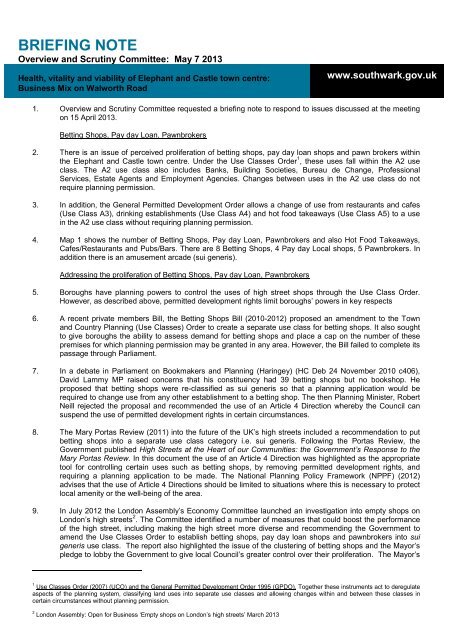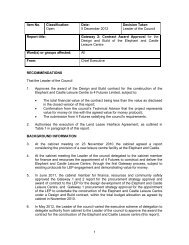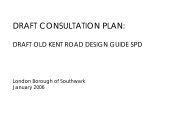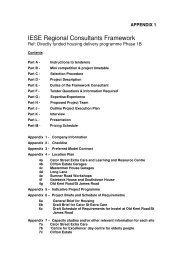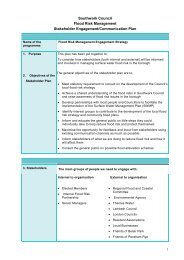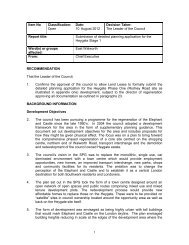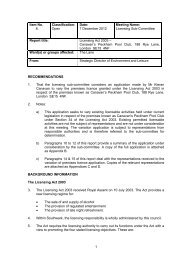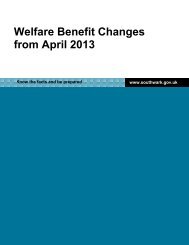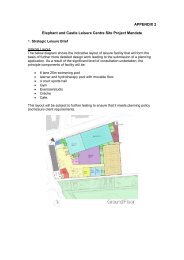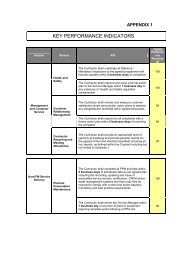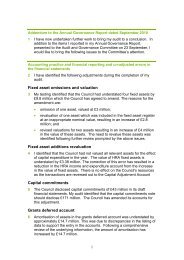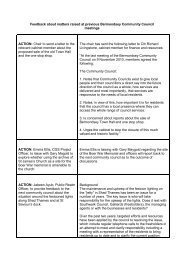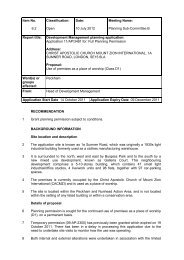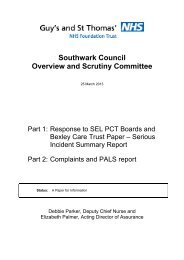Officer Briefing Note , item 6. PDF 136 KB - Southwark Council
Officer Briefing Note , item 6. PDF 136 KB - Southwark Council
Officer Briefing Note , item 6. PDF 136 KB - Southwark Council
You also want an ePaper? Increase the reach of your titles
YUMPU automatically turns print PDFs into web optimized ePapers that Google loves.
BRIEFING NOTEOverview and Scrutiny Committee: May 7 2013Health, vitality and viability of Elephant and Castle town centre:Business Mix on Walworth Roadwww.southwark.gov.uk1. Overview and Scrutiny Committee requested a briefing note to respond to issues discussed at the meetingon 15 April 2013.Betting Shops, Pay day Loan, Pawnbrokers2. There is an issue of perceived proliferation of betting shops, pay day loan shops and pawn brokers withinthe Elephant and Castle town centre. Under the Use Classes Order 1 , these uses fall within the A2 useclass. The A2 use class also includes Banks, Building Societies, Bureau de Change, ProfessionalServices, Estate Agents and Employment Agencies. Changes between uses in the A2 use class do notrequire planning permission.3. In addition, the General Permitted Development Order allows a change of use from restaurants and cafes(Use Class A3), drinking establishments (Use Class A4) and hot food takeaways (Use Class A5) to a usein the A2 use class without requiring planning permission.4. Map 1 shows the number of Betting Shops, Pay day Loan, Pawnbrokers and also Hot Food Takeaways,Cafes/Restaurants and Pubs/Bars. There are 8 Betting Shops, 4 Pay day Local shops, 5 Pawnbrokers. Inaddition there is an amusement arcade (sui generis).Addressing the proliferation of Betting Shops, Pay day Loan, Pawnbrokers5. Boroughs have planning powers to control the uses of high street shops through the Use Class Order.However, as described above, permitted development rights limit boroughs’ powers in key respects<strong>6.</strong> A recent private members Bill, the Betting Shops Bill (2010-2012) proposed an amendment to the Townand Country Planning (Use Classes) Order to create a separate use class for betting shops. It also soughtto give boroughs the ability to assess demand for betting shops and place a cap on the number of thesepremises for which planning permission may be granted in any area. However, the Bill failed to complete itspassage through Parliament.7. In a debate in Parliament on Bookmakers and Planning (Haringey) (HC Deb 24 November 2010 c406),David Lammy MP raised concerns that his constituency had 39 betting shops but no bookshop. Heproposed that betting shops were re-classified as sui generis so that a planning application would berequired to change use from any other establishment to a betting shop. The then Planning Minister, RobertNeill rejected the proposal and recommended the use of an Article 4 Direction whereby the <strong>Council</strong> cansuspend the use of permitted development rights in certain circumstances.8. The Mary Portas Review (2011) into the future of the UK’s high streets included a recommendation to putbetting shops into a separate use class category i.e. sui generis. Following the Portas Review, theGovernment published High Streets at the Heart of our Communities: the Government’s Response to theMary Portas Review. In this document the use of an Article 4 Direction was highlighted as the appropriatetool for controlling certain uses such as betting shops, by removing permitted development rights, andrequiring a planning application to be made. The National Planning Policy Framework (NPPF) (2012)advises that the use of Article 4 Directions should be limited to situations where this is necessary to protectlocal amenity or the well-being of the area.9. In July 2012 the London Assembly’s Economy Committee launched an investigation into empty shops onLondon’s high streets 2 . The Committee identified a number of measures that could boost the performanceof the high street, including making the high street more diverse and recommending the Government toamend the Use Classes Order to establish betting shops, pay day loan shops and pawnbrokers into suigeneris use class. The report also highlighted the issue of the clustering of betting shops and the Mayor’spledge to lobby the Government to give local <strong>Council</strong>’s greater control over their proliferation. The Mayor’s1 Use Classes Order (2007) (UCO) and the General Permitted Development Order 1995 (GPDO). Together these instruments act to deregulateaspects of the planning system, classifying land uses into separate use classes and allowing changes within and between these classes incertain circumstances without planning permission.2 London Assembly: Open for Business ‘Empty shops on London’s high streets’ March 2013
draft Town Centres SPG (January 2013) specifically states (para 2.2.10) “There are genuine planningissues affecting amenity and the continued success of town centres which justify allowing planningauthorities to consider the merits of proposals for betting shops. Betting shops are different in planningterms from the other types of use in the A2 class; they have different hours of operation from other usescovered in A2 (typically they open seven days a week for up to twelve hours a day – rather longer than thetypical financial/business use), with different impacts on local amenity. It is recognised that the planningsystem can only be used to secure land use objectives. It is also recognised that there are currentlimitations in the ability of boroughs to control betting shops by virtue of their A2 use classification. TheMayor has written to the Secretary of State on this issue which will be considered in the context of thecurrent review of the Use Classes Order.”10. In September 2012, the Government consulted on changes to the Use Classes Order. The changesproposed did not consider Betting Shops, Pay day Local shops or Pawnbrokers. In response to theconsultation <strong>Southwark</strong> <strong>Council</strong> requested that these particular types of use are re-classified as ‘suigeneris’use (from their A2 use class), which would require a separate planning application to be made.We understand that the Government is not proposing to make any changes in this respect. However, theGovernment is taking forward a change to the General Permitted Development Order with respect tovacant or redundant buildings, to allow them to convert temporarily to a set of alternative uses includingshops (A1), financial and professional services (A2), restaurants and cafes (A3) and offices (B1) for up totwo years. This change will therefore allow uses in the A2 category which includes Betting Shops, Pay dayLoan and Pawnbrokers to move into empty buildings which have a different established Use Class (suchas A1) without requiring planning permission.11. The concern with this change is that we do not know whether it will fully distinguish between redundantbuildings and those currently occupied by thriving businesses and other activities. Such businesses couldbe threatened by the change if owners sought to maximise their financial return through the replacement ofestablished occupiers rather than filling vacant premises with new uses. The change could also have wideranging and unintended adverse consequences as it may compromise existing planning policies whichseek to balance the mix and spatial pattern of uses in town centres. Existing policy protection for uses suchas shops (A1) in our protected shopping frontages (i.e. the proportion of units in A1 use must not fall below50%) would be undermined by this proposal. It may also prove difficult in terms of local authorityadministrative resources to monitor the enforcement of the expiry of the two year temporary period.Local Authority level – case studies12. In 2009 the London Borough of Lewisham sought powers to set a cap on the number of betting shops inthe borough and to require planning permission for new premises. Lewisham <strong>Council</strong> were attempting touse powers under the Sustainable Communities Act but the proposal was not taken forward by thegovernment.13. Barking and Dagenham <strong>Council</strong> have obtained resolution from their Cabinet that notice be given of the<strong>Council</strong>’s intention to make a non-immediate Article 4 Direction, covering the whole Borough, withdrawingpermitted development rights for conversion of A3, A4 and A5 uses to A2. This is in conjunction withapproving the consultation of a Supplementary Planning Document (SPD) ‘‘Evening the Odds: curbing theproliferation of betting shops’ which aims to assist officers in the processing of forthcoming applications forbetting shops.14. Lambeth <strong>Council</strong> are currently out for public consultation on their Local Plan. Draft Policy ED10 – ‘A2 uses’,sets out criteria for the assessment of new A2 use proposals. The criteria consider over-concentration,with a threshold of 25 per cent or more of total ground floor units in a defined shopping frontage; clusteringi.e. no more than 2 in 5 consecutive premises in A2 in areas outside primary shopping centres and in localcentres; consideration of whether the proposal leads to a reduced vitality and commercial viability in thearea and whether it will give rise to anti-social behaviour and disturbance to local residents and users of thetown centre and a risk to the level of crime. Where permission is granted, conditions may be imposed tocontrol future A2 uses on the site. The policy is however weakened as the Use Classes Order allows thepermitted development between A use classes.15. Haringey <strong>Council</strong> is consulting on a Development Management policies plan and has set out a requirementthat in district town centres uses such as banks/estate agents/betting shops and other financial uses (A2)are limited to 25% of units in town centres. Where planning permission is required for betting shops, thecouncil will only allow a betting shop where there are fewer than three operational betting shops in theCentre. The consultation document does recognise however that the draft policy would still be limited in itimpacts due to the current Use Classes Order and permitted development rights. It is concerned that2
implementing an Article 4 Direction is a blunt tool and the additional bureaucracy may outweigh itseffectiveness, for example a bar would need permission to convert to a post office.1<strong>6.</strong> Newham <strong>Council</strong> has become the first council in the country to use the 'primary activity' of a betting shop intheir decision to reject a licence application. Members of the licensing sub-committee rejected anapplication by the owners of the Paddy Power betting chain to open new premises at 297 Green Street,under section 153 Gambling Act 2005. The council believed the premises would add to the 'cluster' ofbetting shops that already operate on the street. Members decided the application did not meet the criteriafor a betting shop licence as the premises would not be primarily used for betting and that the purpose ofthe application was to increase the number of Fixed Odds Betting Terminals (FOBTs) in the street ratherthan enable traditional betting. Paddy Power is now pursing a legal challenge against the refusal.17. The Mayor of Hackney (and Chair of London <strong>Council</strong>s), Jules Pipe, has written to Leaders and electedMayors of London boroughs to ask for support in a submission to government of a proposal to request achange in the law (using the Sustainable Communities Act) to create a specific Use Class for betting shopsto seek greater local planning powers to control and reduce their concentration. By submitting the proposalunder the Act, it requires the government to consider the proposal and decide whether to implement orreject it. The government must give its assessment of the proposal in writing. Any proposal that is notimplemented by government can be taken up by the "Selector" - a fully independent body that is currentlythe Local Government Association. Central government must negotiate and try to reach agreement with theSelector on whether the initially rejected proposal is implemented. The results of this process can lead toreconsideration or compromise from the government on proposals.18. The Mayor of Newham has also written to London boroughs to ask for support in sending a joint letter tothe Secretary of State for Communities and Local Government to request the Queens speech includelegislative changes within the planning and licensing systems for betting shops. These include puttingbetting shops into a separate use class; the power for local authorities to place problematic uses in a useclass of their own; and changes to the Gambling Act.Legal Implications of an Article 4 Direction19. Article 4 of the Town and Country Planning (General Permitted Development) Order 1995 enables localplanning authorities to restrict permitted development rights in its area or part of its area, or in respect of aparticular development if the Secretary of State or the appropriate local planning authority is satisfied that itis expedient to do so. This can include restricting the permitted development rights to convert A5 (hot foodtakeaway), A4 (drinking establishment) and A3 (restaurant or cafe) uses into A2 (Financial andProfessional service) uses. It should be noted that while an Article 4 Direction would require changes fromA3, A4 and A5 use classes to an A2 use class to obtain planning permission, it would not affect changeswithin the A2 use class. A bank, or a building society or an estate agent could be converted into a bettingshop without needing planning permission.20. In imposing an Article 4 Direction, the <strong>Council</strong> would not be able to single out a particular use such as aBetting shop within the A2 use class. The Direction would need to apply to all uses within the A2 use class,so a change of use to a bank for example would also require permission. An Article 4 Direction does notprevent the development from going ahead, but instead requires that planning permission is first obtainedfrom the local planning authority for that development.21. Any such planning application would then be determined against relevant policies contained in the<strong>Council</strong>’s Local Plan. It would be difficult to grant planning permission for a bank and refuse a betting shopas the Use Classes Order dictates that they have the same characteristics, unless the cumulative impact ofan additional betting shop was assessed and policies were in place to address the clustering of specificretail uses.22. Once planning permission is granted for A2 use, the Article 4 Direction would also not be able to controlchanges of use to another A2 use such as a betting shop. However, the <strong>Council</strong> would be able to conditionplanning permissions for new A2 use to prevent this where it can be justified. This may include theimposition of a restriction of use condition which could specifically exclude certain A2 uses within the A2use class. However, as such a condition would be restricting future change of use which the Use ClassesOrder would otherwise allow, it should be used in exceptional circumstances and requires robust evidenceto support its use to avoid being construed as unreasonable. Paragraph 87 of Circular 11/95: Use ofconditions in planning permissions contains a presumption against such restrictions as set out below:3
“Both development orders and the Use Classes Order, however, are designed to give or confirm a freedomfrom detailed control which will be acceptable in the great majority of cases. Save in exceptionalcircumstances, conditions should not be imposed which restrict either permitted development rightsgranted by development orders or future changes of use which the Use Classes Order would otherwiseallow. The Secretary of State would regard such conditions as unreasonable unless there were clearevidence that the uses excluded would have serious adverse effects on amenity or the environment, thatthere were no other forms of control, and that the condition would serve a clear planning purpose.” .23. Article 4 Directions can cover any geographic area from a specific site to local authority wide. However,there should be a particularly strong justification for the withdrawal of permitted development rights relatingto a wide area e.g. those covering the entire area of a local planning authority. An example where it wouldbe reasonable would be where the operation of the permitted development would undermine localobjectives. The <strong>Council</strong> would need to be satisfied there is good evidential reason(s) to make the Article 4Direction and that if so it should be borough wide. Alternatively, the Article 4 Direction could cover aspecific area and would need to be made for each shopping parade where tighter control was required anda boundary would need to be defined. However, the boundary of the <strong>Council</strong>’s shopping parades may notinclude all of the shops within the local area and some units may still be situated outside of the boundary.23. There are stringent guidelines on the application of an Article 4 Direction. Circular 9/95 ‘GeneralDevelopment Order Consolidation 1995’ contains Government guidance which states:“permitted development rights have been endorsed by Parliament and consequently should not bewithdrawn locally without compelling reasons. Generally... permitted development rights should bewithdrawn only in exceptional circumstances.”24. An Article 4 Direction to remove permitted development rights to reduce the clustering of betting shopsmust be supported by a substantive body of local evidence which demonstrates local need and the harmfuleffects of clustering.Resource Implications of an Article 4 Direction25. In 2010 the Government published the Town and Country Planning (Compensation) (No. 3) (England)Regulations 2010 (2010 No. 2135). This sets out where local authorities’ will be liable to pay compensationwhere they make Article 4 Directions:• Where 12 months’ notice is given in advance of a direction taking effect there will be no liability topay compensation; and• Where directions are made with immediate effect or less than 12 months’ notice, compensation willonly be payable in relation to planning applications which are submitted within 12 months of theeffective date of the direction and which are subsequently refused or where permission is grantedsubject to conditions. Compensation may be claimed for abortive expenditure or for other loss ordamage directly attributable to the withdrawal of the permitted development rights. For example the<strong>Council</strong> could be liable for the loss of income a property owner suffers by not being able to converttheir property into a betting shop where this is due to the Article 4 Direction. However an immediatedirection may incentivise property owners to claim for compensation for changes of use to bettingshops they would not otherwise have carried out. This could leave the <strong>Council</strong> with a verysignificant liability.2<strong>6.</strong> Therefore to avoid potential compensation claims the <strong>Council</strong> would need to provide 12 months notice inadvance of an Article 4 Direction taking affect. This is called a non-immediate direction.27. The procedure for making a “non-immediate” Article 4 Direction is as follows:• Give 12 months notice of direction• Seek representations• Cabinet approval• Advertise direction and notify Secretary of State28. The Direction would come into effect 12 months after the notice had been placed.29. There would be a need to be extensive public and business consultation in the areas proposed for anArticle 4 Direction to limit permitted development rights. Any body of evidence compiled to support anArticle 4 Direction which sought to control the proliferation of betting shops would have to be robust and4
conclusive in terms of any harm resulting as a result of this proliferation or potential challenge frominterested parties.30. The benefits from a successful Article 4 Direction would need to be weighed against the scale of resourcesrequired to support an Article 4 Direction.Fees31. Where an Article 4 Direction has been made, the planning application fees should be waived as theapplication for planning permission is only required by virtue of an Article 4 Direction removing permitteddevelopment rights (Paragraph 5 (1) b(i) of The Town and Country Planning (Fees for Applications,Deemed Applications, Requests and Site Visits) (England) Regulations 2012 confirms the fee exemption).Protected shopping frontage policy28. <strong>Southwark</strong> Plan Policy 1.9 ‘Change of use within protected shopping frontages’ protects A1 retail use(general retail shops). A change of use from A1 will only be permitted where the proportion of units in A1does not fall below 50%. We also take into consideration A1 premises which have been vacant for aperiod of at least 12 months with evidence that there has been a demonstrated effort to let it out, or thebusiness has not made a profit over a 2 year period.29. Given that the current policy sets a threshold of 50% of units as non-A1 use, it can prove difficult to refusean application for an A2 use. The A use class hierarchy of the Use Classes Order is arranged in a mannerwhich categorises the uses based upon ‘relative impact’. Therefore it would be difficult to justify under thecurrent Use Classes Order, a specification for more A3, A4 or A5 uses as opposed to A2 uses, within aprotected shopping frontage policy.30. The policy would needed to be reviewed and further evidence collated to justify the cumulative impact ofbetting shops/pay day shops upon the retail environment, to support a preference for other uses.Table 1Planning class Description /example usesA1 ShopsGeneral retail,hairdressers, travelagents, post offices,dry cleaners,sandwich bars,supermarkets,discount stores,A2 Financial andprofessional servicesA3 Restaurants andcafésA4 DrinkingestablishmentsA5 Hot foodtakeawayscharity shopsBanks, buildingsocieties, estateagents, betting shops,pawnbrokers, paydayloan shopsUnits selling food anddrink for consumptionon the premisesPublic houses andwine bars, but notincluding night clubsUnits selling hot foodfor consumption offthe premisesPermitted changes(without approval)Within A1Within A2, or to A1Within A3, or to A1,A2Within A4, or to A1,A2, A3Within A5, or to A1,A2, A331. Table 2 below sets out the history of the shop units, where known, currently being used for A2 Bettingshop, Pay day loan shops and Pawnbrokers. Four Betting Shops and one Pay day loan shop haveplanning permission history. It is assumed the remaining shops are in operation through permitteddevelopment.5
Table 2William Hill 204 Walworth Road Betting Shop (A2)Paddy Power 220-222 Walworth Road Betting Shop (A2)Oakham Loans 240 Walworth Road Pay day loan (A2) No planning historyPlanning Permission: Change of use from a A1 to a A2 Licensed Bettingshop refused 06/07 and granted on appeal 03/08History: New shopfront, a/c units and satellite dishes for existing Bookmakergranted on 07/04Permitted DevelopmentHistory: Replacement of existing internally illuminated signage frontingWalworth Road and Penrose Street for Woolwich Society Bank granted on07/03.Bet Fred 262 Walworth Road Betting Shop (A2)Albone Jewellers 296 Walworth Road Pawnbrokers (A2) No planning historyCash Converters 312 Walworth Road Pawnbrokers (A2) No planning historyWilliam Hill 386-388 Walworth Road Betting Shop (A2) New shopfront to existing Bookmaker granted on 06/98Amusement ArcadeCash City229 Walworth Road(sui generis)Fish Brothers - Pawnbrokers 241 Walworth Road Pawnbrokers (A2) No planning historyLadbrokes (formerlyNationwide) 259-261 Walworth Road Betting Shop (A2)Planning Permission (not yet implemented): Change of use from amusementarcade (sui generis) to A1 - swapped with 281 Walworth RoadPermitted DevelopmentHistory: Removal of condition 1 of planning permission Ref: TP/1065/259/dated 25th January 1977: which provided for the use of the site as a buildingsociety office; condition 1 presently reads: 'The building shall only be used fora building society office and for no other purpose, including any other purposein Class II of the Schedule of the Town and Country Planning (Use ClassesOrder 1972)', to enable the premises to be used by other Class A2 operatorsgranted on 07/11Was formally Nationwide BankSpeedy Cash Loans (formerlyAtlantic Clothing) 269-271 Walworth Road Pay day loan (A2) Planning Permission: Change of use granted from A1 to A2 on 01/11Adult Gaming Centre (inprocess)281 Walworth RoadAmusement Arcade(sui generis)Planning Permission: Swap with 229 Walworth Road - change of use fromA1 to amusement arcade (sui generis) (being implemented). Further Planningapplication submitted in 2012 for change of use from amusement arcade (suigeneris) to Bingo Hall (D2) (not yet decided)Albermarle & Bond 301 Walworth Road Pawnbrokers New signage to an existing pawnbroker granted on 05/10Walworth Road ChequeCashers 331-333 Walworth Road Pay day loan (A2) No planning historyAgora Betting Shop 353 Walworth Road Betting Shop (A2) Planning Permission: Change of use from A1 to A2 granted 10/1996BetFred 361-363 Walworth Road Betting Shop (A2)Planning Permission: Change of use from A1 shop to licensed betting shop(A2) granted 05/2004H & T Pawnbrokers 391 Walworth Road Pawnbrokers (A2) No planning historyThe Money Shop 5 Camberwell Road Pay day loan (A2) No planning historyCoral 7-11 Camberwell Road Betting Shop (A2) No planning history


